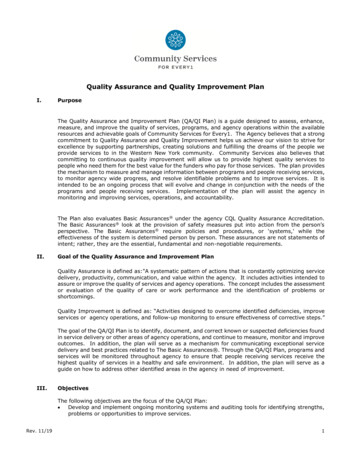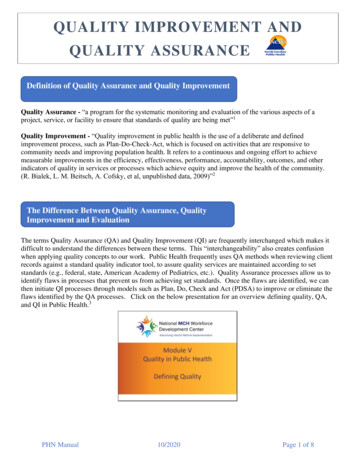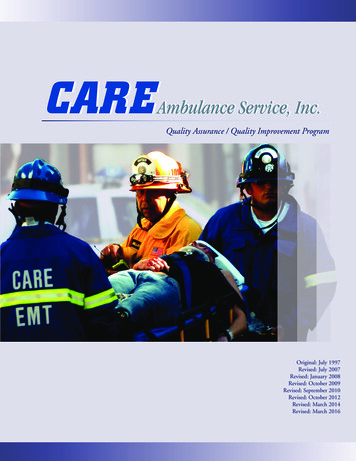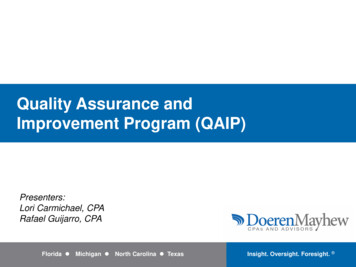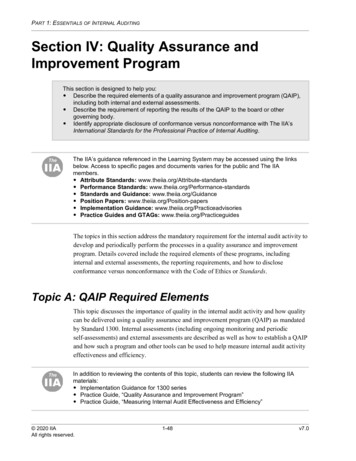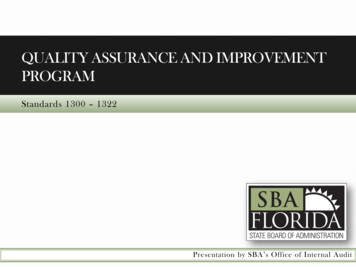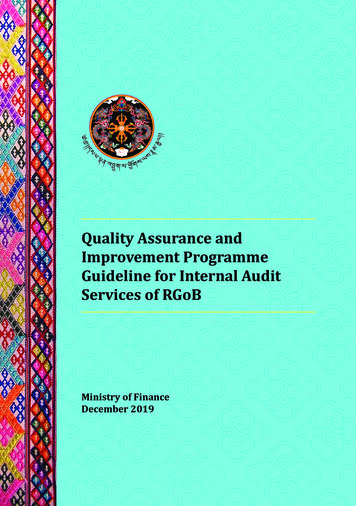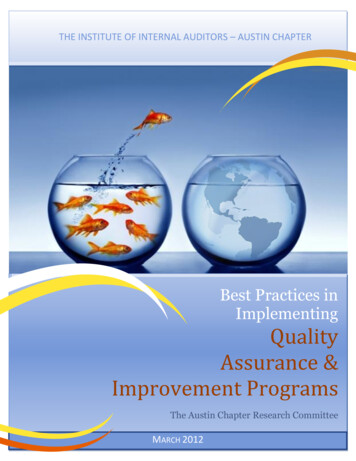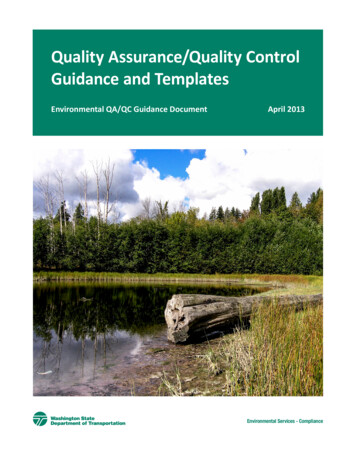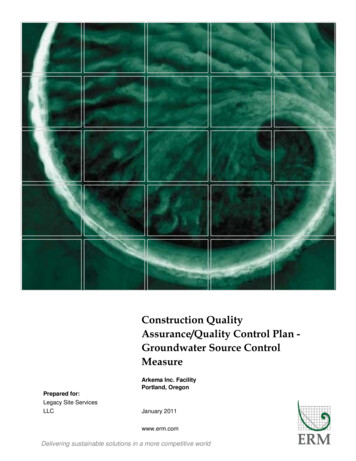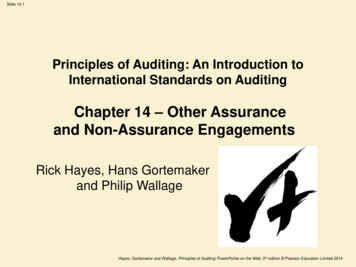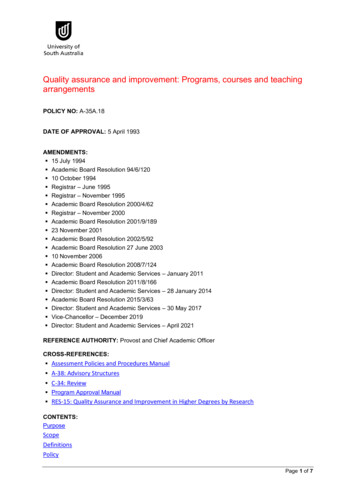
Transcription
Quality assurance and improvement: Programs, courses and teachingarrangementsPOLICY NO: A-35A.18DATE OF APPROVAL: 5 April 1993AMENDMENTS: 15 July 1994 Academic Board Resolution 94/6/120 10 October 1994 Registrar – June 1995 Registrar – November 1995 Academic Board Resolution 2000/4/62 Registrar – November 2000 Academic Board Resolution 2001/9/189 23 November 2001 Academic Board Resolution 2002/5/92 Academic Board Resolution 27 June 2003 10 November 2006 Academic Board Resolution 2008/7/124 Director: Student and Academic Services – January 2011 Academic Board Resolution 2011/8/166 Director: Student and Academic Services – 28 January 2014 Academic Board Resolution 2015/3/63 Director: Student and Academic Services – 30 May 2017 Vice-Chancellor – December 2019 Director: Student and Academic Services – April 2021REFERENCE AUTHORITY: Provost and Chief Academic OfficerCROSS-REFERENCES: Assessment Policies and Procedures Manual A-38: Advisory Structures C-34: Review Program Approval Manual RES-15: Quality Assurance and Improvement in Higher Degrees by ResearchCONTENTS:PurposeScopeDefinitionsPolicyPage 1 of 7
ProceduresAppendix A: Timeline for a program due for re-accreditationPurposeQuality assurance and continuous improvement of the University’s educational programs arefundamental to the mission of the University of South Australia.This policy establishes the framework for evaluating the quality and viability of all programs and forthe systematic monitoring and review of programs and courses. It is based on the followingprinciples:1. The University is committed to a cycle of evaluation and improvement as part of academicplanning. Within this cycle, academic staff and teaching teams are required to: review the contentand focus of their courses; evaluate and reflect on student learning resulting from their teachingpractice, curriculum design and approaches to assessment; and make appropriate revisions asrequired.2. The University recognises that the resources available to develop and sustain programs may affecttheir quality. The University will evaluate the value, relevance and viability of its programs toensure available resources are used to maximum effect.3. The University will use multiple sources of qualitative and quantitative data in the evaluation of itscourses, programs and teaching, including feedback from students and stakeholders.The evaluations and reviews conducted under this policy and their outcomes form part of theUniversity’s program approval and review procedural framework.ScopeThis policy applies to all coursework programs offered by the University.DefinitionsASSQC: Academic Strategy, Standards and Quality CommitteeBenchmarking means the comparison of performance and process against best practice andperformance in the higher education sector or elsewhere with the aim of improving University courses,programs and teaching. Wherever possible, national and international reference points will be used.Continuous improvement means the ongoing review cycle designed to progressively improvecourses, programs and teaching outcomes.Evaluation of quality means:a. the systematic consideration of stakeholder views and benchmarking activities about the quality ofprograms and courses; and,b. the aggregation, analysis and interpretation of students’ feedback about their perceptions of theircourses to inform judgments about the quality of programs.Evaluation of viability means the assessment of the viability of programs based on performanceagainst an agreed set of indicators, and referenced against University-based targets.Page 2 of 7Policy A-35A.18: Quality assurance and improvement: Programs, courses and teaching arrangements
Professional accreditation means the formal process of assessment and review by a relevantaccrediting body leading to formal recognition that a program meets the standards required to ensurethat graduates possess the competencies necessary to begin professional practice. Professionalaccreditation may include the requirement for graduates to gain formal registration with the relevantstatutory body before they can begin professional practice.Quality assurance means the application of monitoring, review and evaluation processes to ensurethat the University’s teaching and learning processes and outcomes are meeting the standardsdefined by the University, through this policy and its broader strategic goals.Re-accreditation Report means a submission prepared by the academic unit for the re-accreditationof a program.Policy1.2.Program accreditation1.1University programs will be accredited for a maximum period of five years from the dateof (re)accreditation.1.2Where appropriate, the accreditation period may be aligned with external professionalaccreditation requirements approved as part of the Coursework Program Approvalprocedures.1.3Where the relevant external professional accreditation is granted for a period less thanfive years, the Academic Unit, through Academic Strategy, Standards and QualityCommittee (ASSQC), may choose to renew their internal accreditation at the same time,up to the maximum period of five years.1.4The Provost and Chief Academic Officer may approve a variation to the period for whicha program is accredited. The variation may operate to extend the period for which aprogram is accredited up to a maximum of one year.1.5By the end of the fourth year of (re)accreditation, or as aligned to an externalprofessional accreditation review, Academic Units are required to provide a reaccreditation report, in accordance with section 7 below. If it has been identified thatamendments to the program are required, these should be carried out during the fifthyear of the (re)accreditation cycle. See Appendix A.1.6Where a program is being withdrawn and not replaced, the program will be subject to aphase-out plan in accordance with policy A-45: Program Transition enabling students toprogress through the award. Where a phase out plan is in place the University considersthat a program has met the requirements of this policy and will remain accredited for theapproved phase-out period.Program monitoring and review2.1On an annual basis, the University will review the performance of its programs based onthe University’s program performance data and any additional strategic measures asdetermined by the Academic Board from time to time, on advice from the Provost andChief Academic Officer.2.2The annual review of performance may identify amendments to ensure the ongoingsuccess of the program. Any amendments to programs will be undertaken in accordancewith the Program Approval Manual.2.3Programs whose performance is consistently below University targets and benchmarksmay be required to show cause as to why the program should not be withdrawn.Page 3 of 7Policy A-35A.18: Quality assurance and improvement: Programs, courses and teaching arrangements
3.4.Course evaluation3.1ASSQC will develop, review and monitor the course and teacher evaluation survey, forthe evaluation of courses and teaching. Academic Board will approve the survey.3.2The University will evaluate each course each time it is offered, or if offered more thanonce in an academic year, at least annually, using the approved course and teacherevaluation survey.3.3Any amendments to courses identified through the evaluation will be undertaken inaccordance with the Program Approval Manual.Responsibility4.1Responsibility for implementing the arrangements outlined in this policy rests jointly withAcademic Units, ASSQC and Academic Board.Procedures5.6.Course evaluation5.1Every course must be evaluated using the University’s course and teacher evaluationsurvey each time it is offered, or if offered more than once in an academic year, at leastannually.5.2Where an Academic Unit believes it would be inappropriate to apply the course andteacher evaluation survey for a course or an offering of that course, the Executive Dean,or delegate, may authorise an alternative evaluation mechanism.5.3Other evaluative mechanisms may be used to complement the course and teacherevaluation survey, for example, learning analytics data and trends, focus groups, peerreview and benchmarking.5.4A short summary of changes and improvements arising from the course and teacherevaluation will be placed on the Course Homepage or equivalent before the course isnext taught, to inform students about the value of their feedback.Program monitoring and review6.1A review of performance for all coursework programs will be undertaken every year asspecified in clause 2 of this policy.6.2The Provost and Chief Academic Officer will meet with each Executive Dean, ordelegate, and, relevant Academic Unit staff, to review the performance of each program.6.3Where the process identifies programs of concern (clause 2.3), the Provost and ChiefAcademic Officer will recommend to ASSQC that:a. the program’s evaluation and re-accreditation review be brought forward; orb. the Executive Dean, or delegate, be required to show cause as to why the programshould not be withdrawn.6.4Programs identified for review under clause 6.3.a. above, will form part of the annualschedule of program evaluation and re-accreditation established by ASSQC.ASSQC will report annually to Academic Board on:a. the actions taken in response to the annual monitoring of program performance; andb. the status of the University’s academic program profile as measured againstUniversity strategic objectives.6.5Page 4 of 7Policy A-35A.18: Quality assurance and improvement: Programs, courses and teaching arrangements
7.Program evaluation and re-accreditation7.1ASSQC will establish an annual schedule for program evaluation and re-accreditation toensure that all programs are evaluated for the purposes of re-accreditation in thepenultimate year of the accreditation period.7.2Programs that have not undergone program evaluation and review processes inaccordance with this policy are considered non-compliant offerings. Executive Deans, ordelegates, must determine further action to be taken in relation to non-compliantprograms, including the expedition of internal accreditation processes, or programwithdrawal.7.3The evaluation processes and reporting are managed by the program areas. ExecutiveDeans, or delegates, will establish processes to:a. gather and analyse responses from relevant external stakeholders, for example,professional associations, employer groups, and accrediting bodies; andb. ensure staff who teach courses in the program participate in the analysis andinterpretation of program performance data, including reporting on program outcomesagainst national benchmarks.7.4Student evaluation of a program will be achieved by aggregating data from the results ofthe University’s course and teacher evaluation survey for the core courses that comprisethe major streams of the program, as listed in the program schedule. The ProgramDirector is responsible for interpreting the program schedule to determine core coursesand major streams.7.5The Academic Unit will prepare a re-accreditation report of no more than ten pages, forthe re-accreditation of the program. This report will present a case for re-accreditationbased on analysis of program performance data over the accreditation period, otherrelevant information and evidence of:a. the ongoing relevance and viability of the program and how it will continue tocontribute to the strategic goals of the Universityb. the aims and objectives of the program and how the program structure and teachingarrangements support those objectivesc. the effectiveness of the program design and approaches to curriculum innovationincluding, for example, blended delivery and practice-based learningd. the effectiveness of the teaching and learning and assessment arrangements andhow those arrangements contribute to student learning, and align with and developcore capabilities and graduate qualitiese. processes to monitor the achievement of student learning outcomes includingprocesses for external benchmarking against comparable programs of studyf. processes to monitor the ongoing performance of the program and how studentfeedback and other stakeholder feedback, including employers and professionalbodies, is used to monitor and improve the program and its outcomesg. processes for effective program management and coordination, particularly processesto ensure that service teaching providers, or double degree partners, make effectivecontribution to the programh. the overall performance of the program against national and internationalbenchmarks. The Re-accreditation Report will identify areas for improvement and howthose improvements will be implemented.Page 5 of 7Policy A-35A.18: Quality assurance and improvement: Programs, courses and teaching arrangements
8.7.6Where a program is externally accredited, the Re-accreditation Report may refer to orreplicate relevant information submitted as part of the external process.7.7Any amendments to programs arising from the evaluation will be undertaken inaccordance with the Program Approval Manual.7.8The Re-accreditation Report will be considered by the Academic Unit board. The Reaccreditation Report and any supporting program amendments will together form thesubmission for re-accreditation or withdrawal of the program to ASSQC and AcademicBoard.7.9ASSQC will report annually to Academic Board on the outcomes of the programevaluation and re-accreditation process.Vice Chancellor’s Review8.1Programs subject to a Vice Chancellor’s Review in accordance with policy C-34: Revieware not required to present a Re-accreditation Report for that review period, where theinformation provided for the Vice Chancellor’s review is equivalent to that required withina Re-accreditation Report.Page 6 of 7Policy A-35A.18: Quality assurance and improvement: Programs, courses and teaching arrangements
Appendix A: Timeline for a program due for re-accreditationExample:If a program is due to be r
Policy A-35A.18: Quality assurance and improvement: Programs, courses and teaching arrangements. Procedures. Appendix A: Timeline for a program due for re-accreditation . Purpose . Quality assurance and continuous improvement of the University’s educational programs are fundamental to the mission of the University of South Australia.
